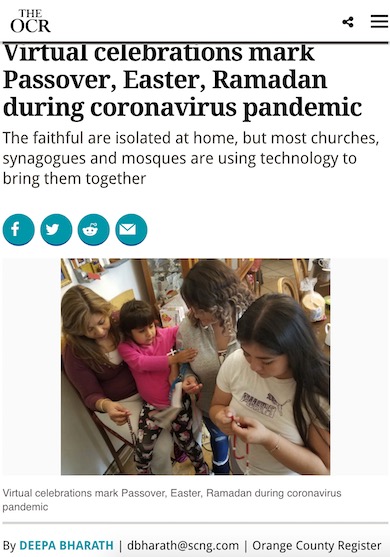News from our members around the world in a time of coronavirus

The COVID-19 pandemic is posing new challenges to journalists covering faith and religion. In early April, we had an unprecedented convergence of virtual
Jewish, Christian and Muslim observances, so we invited our IARJ members covering this unprecedented story to share their holiday-related religion stories.
We continue to receive news reports related to the impact of COVID-19 in different regions of the world.
We are pleased to share with you some of the links we are receiving.
Indeewari Amuwatte, news anchor at Ada Derana, which is a breaking-news website offering news from Sri Lanka, covered extensively the impact of coronavirus on religious communities, major religious holidays and new year. Her reporting, which is available on Ada Derana YouTube channel, includes the threat of religious and racial tensions related to limits on cremation and burial—and other religious issues complicated by COVID-19.
Judith Sudilovsky, a freelance reporter based in Israel, shared with us her reporting on the Holy Week in Jerusalem, published in several Catholic newspapers: Surgical masks, social distancing: Palm Sunday in Jerusalem’s Old City; During holiest week of the year, the Holy Land celebrates without pilgrims; Bethlehem family, on lockdown, prepares for Easter with films on saints; When families pray together, Jesus is there, says Jerusalem archbishop.

In The Orange County Register, Deepa Bharath covered religious holidays in different faith communities in her area: Virtual celebrations mark Passover, Easter, Ramadan during coronavirus pandemic.
London-based visual journalist Sophia Smith-Galer, produced a video for BBC Heart and Soul, with tips from people of faith around the world on how to make the most of virtual faith, when celebrating important religious gatherings: Passover, Ramadan and Easter: How to celebrate without leaving home.
Italian journalist Paolo Affatato, Asia Editor at Agenzia FIDES information service, shared with us the link to this piece on religious events in Myanmar: Buddhist New Year and Christian Easter in confinement, due to Covid-19. He also shared his work on interreligious efforts in India: An interreligious team to offer psychological advice during the “lockdown” imposed for coronavirus—and in Uzbekistan: A “Telegram” channel to unite the various religious faiths in times of coronavirus—and in Pakistan Covid-19: religious minorities discriminated against in the distribution of food.
The chair of our IARJ board Douglass Todd reported a story headlined: Can Christians, Jews and Muslims celebrate
during lockdown? Toward the end of this report on all three Abaramic faiths, Todd talks to Muslim community leaders about the impact of distancing on Ramadan. One says there may be spiritual insights that come from this difficult time: This pandemic is simplifying things. It’s got many people, including my family, looking more at what’s important. It might help all of us to slow down and get our act together.
African Perspectives
Our members from Africa are reporting on how the coronavirus outbreak has changed religious lives, especially in countries where religious services and gatherings have been banned, but also on the ways media—especially radio—and social media are supporting the faithful and helping communities in spreading useful information.
Freelance radio journalist Williams Moi shared with us some updates from Uganda, where there is no prayer on Sundays, since public gatherings, including African ancient prayers usually conducted under trees in groups, were banned. Those who attempt to go to church are arrested and charged and prosecuted,
he said. People have gone back to ancient tradition of individual prayer inside their homes, where only family members are allowed to pray together. Bishops and pastors willing to hold religious services with less than ten people—including weddings—should seek permission from higher authorities or COVID-19 task force.
As a consequence of that, mass awareness is being done by radio and TV stations around the country, with prayers about Covid-19, talk-shows and music, as a measure to fight the virus. Some Ugandans believe in prayer to end the pandemic.
Moi calls it a media prayer or mass communication prayer, since it conducted via telephone calls in religious programs.
If you are a religion journalist with a fresh perspective on religion and coronavirus, email us with a link to your story. On this topic, our IARJ religion writers can email elisadibenedetto@theiarj.org
